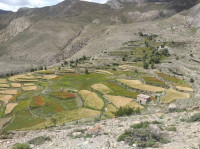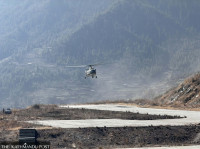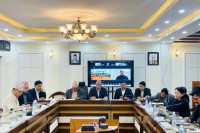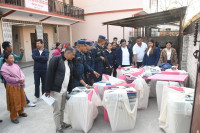National
On his first day in Kathmandu, Xi announces Rs 56 billion in economic assistance over the next two years
The Chinese president also announced that China would conduct the detailed project report for the long-awaited Kathmandu-Kerung cross-border railway..jpg&w=900&height=601)
Anil Giri
Chinese President Xi Jinping arrived in Kathmandu on a two-day state visit on Saturday, in what Foreign Minister Pradeep Gyawali described as a “big diplomatic success” of the KP Sharma Oli administration.
“The Chinese president’s visit is quite important,” Gyawali told the Post. “While development cooperation and partnership are on the agenda, our key focus is deepening our friendship with China.”
About an hour after landing at Tribhuvan International Airport at 4:46 pm, Xi started his official engagements, beginning with delegation-level talks with President Bidya Devi Bhandari.
“In an atmosphere of utmost cordiality and friendship, President Bhandari and President of the People’s Republic of China, Xi Jinping, held bilateral talks at Office of the President,” tweeted the Ministry of Foreign Affairs.
“I am impressed with the way I was cordially welcomed and received at the airport today,” the Chinese President told his Nepali counterpart during the meeting, according to a Foreign Ministry official who was present at the delegation-level talks. “That was memorable and showed how the Nepali people love the Chinese people.”
Xi further said that China always stands for Nepal’s development and praised Nepal for also standing by the one-China policy.
During the meeting with Bhandari, Xi announced that China will provide Rs 56 billion in aid for Nepal over the next two years, according to a Nepali official who was present at the meeting.
“This Chinese aid will be provided for 2020-22 as economic assistance to Nepal,” the official told the Post on condition of anonymity.
Later on Saturday evening, at a banquet hosted by Bhandari, Xi further announced that China would conduct the detailed project report for the trans-Himalayan railway that will connect Kathmandu with China. The preparation of a DPR was for the 72-kilometre rail line between Kerung and Kathmandu was high on the agenda. China will conduct the DPR within two years, said Xi. Details will be made public on Sunday.
Xi, while referring to the announcement of conducting the DPR of the rail project, said that Nepal will no longer remain landlocked, it will now be a land-linked country.
Addressing the banquet at the Soaltee Crowne Plaza, Xi also said that China would extend all possible cooperation to make Visit Nepal 2020 a success.
On Sunday, Xi will hold delegation-level talks with Prime Minister KP Sharma Oli and the two countries will sign around a dozen and a half agreements and memoranda of understanding on various areas, ranging from infrastructure, connectivity, education, people-to-people relations, trade, commerce, energy, and cross-border transmission lines.
In what political analysts are calling the arrival of a new geopolitical actor in Kathmandu, China is likely to generously loosen its purse strings.
Officials said agreements and memoranda of understanding worth over $5 billion are expected to be signed on Sunday.
If final negotiations yield positive results, agreements and understandings to be signed on Sunday are expected to be worth between $8 billion and $10 billion in projects identified under the Belt and Road Initiative (BRI), according to top government officials involved in the negotiations.
China will be offering grants as well as soft loans for various projects under the BRI and other non-BRI projects too, including upgrading the Kodari Highway, the only highway that links China with Nepal. Nepal has proposed expanding the Kodari Highway from Miteri Bridge to Dhulikhel under a Chinese grant, according to officials.
Two stalled hydropower projects—the 762MW Tamor and 1,200MW Budhi Gandaki—are likely to be revived with Chinese investment. On Friday, a meeting of the Investment Board Nepal awarded the survey licence to Nepal’s Hydroelectricity Investment and Development Company and its Chinese joint venture, Power Construction of China Limited, to carry out survey works to develop the project, which would need an investment of $1.3 billion. Negotiations are also ongoing for the Kimathanaka-Arun hydropower project, which will have an installed capacity of 1,020 megawatts.
Agreements for the establishment of the Madan Bhandari Science and Technology University in Chitlang, Makwanpur, which is expected to cost Rs 43 billion; construction of at least three north-south corridors—Koshi, Karnali and Gandaki—that will link the Indian and Chinese borders; construction of the six-kilometre Tokha-Chahare tunnel; a road up to Rasuwagadhi via Betrawati in Nuwakot; and the Kimathanka-Hile road section will also be signed.
Other projects under the same package include upgrading the Kimathanka and Korala border points, setting up an Ayurvedic medicine plant in Nepal, and cooperating in the energy sector with the construction of a 400kV transmission line.
“We are currently working to sign agreements and MoUs for around 17 projects, but back-channel negotiations to reach an agreement on the exact number are ongoing with the Chinese side,” said Foreign Minister Gyawali.
A key announcement that everyone is looking forward to is the much-talked-about “surprise” announced by the Chinese before Xi’s visit.
“We are not sure whether there will be a separate ‘surprise package’ to Nepal as the Chinese side has not disclosed anything yet,” said another official who was part of the delegation-level talks requesting anonymity because he was not allowed to speak to the media.
A joint communiqué will be released at the end of the visit.




 25.96°C Kathmandu
25.96°C Kathmandu















